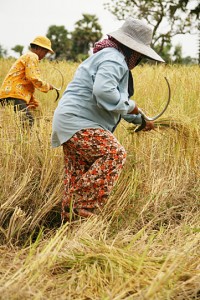Village Life in Kampong Cham
 50% of the population of Cambodia is under 16 years old.
50% of the population of Cambodia is under 16 years old.
I noticed that immediately when I first came in to the capital city of Phnom Penh. I saw thousands of people, but very few over the age of 50. It’s like an entire generation has all but disappeared.
So I was particularly pleased to be able to speak with some older folks and ask them about their experiences: before, during and after the Khmer Rouge regime under Pol Pot.
Several hours north of Phnom Penh on the Mekong river, I stayed in a hut in a tiny little village just outside of Kampong Cham. Walking through the rice fields and village with the English-speaking woman whose house I was staying in, it was a wonderful opportunity to speak with the villagers and ask questions.
The woman’s parents, for instance, were married through an arranged marriage, which is the traditional method in this area. The mother had never met nor spoken to her husband-to-be until the day of their wedding. And then she found out that they didn’t get along. She said it took them months to learn to successfully cohabitate, and that to this day they are still like a “knife and cutting board,” to use her expression.
Things have changed a little bit, but not that much. Some families now allow a right of refusal, so that if the two betrothed meet and one of them has serious objections, they can refuse the marriage. This still makes for some high-stakes judgment calls, however. As it was explained to me, the prospective bride and groom may be given 15 minutes to meet and chat before the parents come back in and ask: “so, do you love each other?”
And of course there are suitors. Men who see an eligible girl who strikes their fancy (most girls marry between 17 – 19), and have their parents go to the girls’ parents to ask for her in marriage. Even if there is no interest on the girl’s part, this can create trouble: one woman explained that when she was of age, one suitor got really jealous that another man had shown interest, so he wrote her a letter threatening to toss a hand grenade into their wedding ceremony should she choose that other guy. Ah, love.
Life as a Cambodian farmer is not easy. Long hours, back-breaking work in the fields, no vacation, very little income. But it was even worse during the war.
During the Khmer Rouge period (1975 – 1979), all private land was confiscated (and money was abolished). Families were separated (men from women, women from children), and forced to work even harder in the fields. But they owned nothing of what they produced, and famine, disease and starvation were real issues.
When Vietnam “liberated” Cambodia from the Khmer Rouge in 1979 and occupied the country for the next 10 years, they imposed a different sort of communism. They created groups of 10 families and apportioned each of them plots of land to communally cultivate. At least they could be with their own families, so this was better from a social standpoint, but it was still very difficult and unproductive, and the quality of life was very poor.
Only in the 1990s after the fall of the Soviet Union and the withdrawal of communist Vietnamese troops was private ownership reintroduced. But no one got their old land back. Instead, they had what was apportioned to them from the Vietnamese, and over time families were able to sell or acquire land from others. Everyone essentially restarted from scratch.
I spoke to farmers, handicraft makers, brick makers, and teachers. Even an old Buddhist monk who donned the robes after his wife died. Now in his 70s, he says he has trouble believing that he’s no longer the strong and spry young boy he once was.
Teachers make very little money: starting in this profession will earn you all of $20 a month salary. So the teacher I met, who was filling out students’ report cards on a Sunday, also has to work supplemental hours in the fields or on the farm to make ends meet.
It is a difficult life in the village. As one person explained, it is better than during the 70s and 80s, but not as good as life before the war in the 50s and 60s. Perhaps the new generation will see their villages prosper once again.
 Click to subscribe via RSS feed
Click to subscribe via RSS feed
